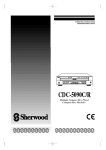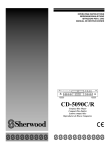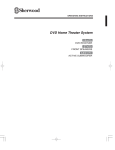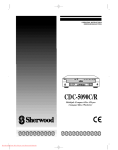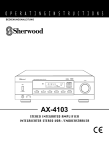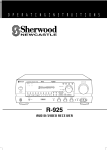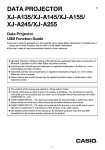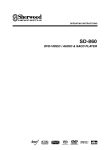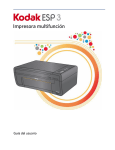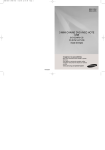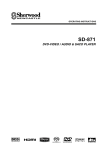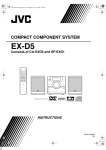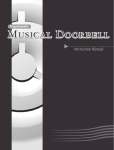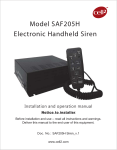Download Sherwood V-768 User's Manual
Transcript
ENGLISH UNPACKING AND Congratulations on Your Purchase! Your new DVD Video Player is designed to deliver maximum enjoyment and years of trouble free service. Please take a few moments to read this manual thoroughly. It will explain the features and operation of your unit and help ensure a trouble free installation. Please unpack your unit carefully. We recommend that you save the carton and packing material. They will be helpful if you ever need to move your unit and may be required if you ever need to return it for service. Your unit is designed to be placed in a horizontal position and it is important to allow at least two inches of space behind your unit for adequate ventilation and cabling convenience. To avoid damage, never place the unit near radiators, in front of heating vents, in direct sunlight, in excessively humid, dusty locations or near sources of strong magnetic fields. Connect your complementary components as illustrated in the following section. FOR U.S.A FCC INFORMATION This equipment has been tested and found to comply with the limits for a Class B digital device, pursuant to Part 15 of the FCC Rules. These limits are designed to provide reasonable protection against harmful interference in a residential installation. This equipment generates, uses and can radiate radio frequency energy and, if not installed and used in accordance with the instructions, may cause harmful interference to radio communications. However, there is no guarantee that interference will not occur in a particular installation. If this equipment does cause harmful interference to radio or television reception, which can be determined by turning the equipment off and on, the user is encouraged to try to correct the interference by one or more of the following measures: Reorient or relocate the receiving antenna. Increase the separation between the equipment and receiver. Connect the equipment into an outlet on a circuit different from that to which the receiver is connected. Consult the dealer or an experienced radio/TV technician for help. CAUTION RISK OF ELECTRIC SHOCK DO NOT OPEN CAUTION : TO REDUCE THE RISK OF ELECTRIC SHOCK, DO NOT REMOVE COVER (OR BACK). NO USER-SERVICEABLE PARTS INSIDE. REFER SERVICING TO QUALIFIED SERVICE PERSONNEL. CAUTION: Any changes or modifications in construction of this device which are not expressly approved by the party responsible for compliance could void the user's authority to operate the equipment. This symbol is intended to alert the user to the presence of uninsulated "dangerous voltage" within the product's enclosure that may be of sufficient magnitude to constitute a risk of electric shock to persons. PRECAUTIONS Moisture condensation Moisture may form on the lens in the following conditions. Immediately after a heater has been turned on. In a steamy or very humid room. When this unit is moved from a cold place to a warm one. If moisture forms inside this unit, it may not operate properly. In this case, turn on the power and wait about one hour for the moisture to evaporate. If there is noise interference on the TV while a broadcast is being received. Depending on the reception condition of the TV, interference may appear on the TV screen while you are watching a TV broadcast and this unit is left on. This is not a malfunction of this unit or the TV. To watch a TV broadcast, turn off this unit. Do not transport this unit with discs left in it. Do not place on the component such as amplifier or receiver that generates heat. If so, the temperature inside this unit rises and malfunction may occur. This symbol is intended to alert the user to the presence of important operating and maintenance (servicing) instructions in the literature accompanying the appliance. WARNING To reduce the risk of fire or electric shock, do not expose this appliance to rain or moisture. CLASS 1 LASER PRODUCT CAUTION Invisible laser radiation when the unit is open. Do not stare into beam. CAUTION : USE OF ANY CONTROLS, ADJUSTMENTS, OR PROCEDURES OTHER THAN THOSE SPECIFIED HEREIN MAY RESULT IN HAZARDOUS RADIATION EXPOSURE. 2 FOR U.S.A AND CANADA............................... 120 V FOR CHINA, EUROPE, AUSTRALIA AND OTHER COUNTRIES ............................................................... 100V - 240 V FOR YOUR SAFETY Units shipped to the U.S.A and Canada are designed for operation on 120 V AC only. FOR YOUR SAFETY The available power supply voltage differs according to country or region. However, this unit is equipped with an Automatic Voltage Selector. The power supply voltage of the area where the unit will be used automatically meets the required voltage within the range of AC 100 - 240 V, without any manual voltage adjustment. To ensure safe operation, the three-pin plug supplied must be inserted only into a standard three-pin power point which is effectively earthed through the normal household wiring. Extension cords used with the equipment must be three-core and be correctly wired to provide connection to earth. Improper extension cords are a major cause of fatalities. The fact that the equipment operates satisfactorily does not imply that the power point is earthed and that the installation is completely safe. For your safety, if in any doubt about the effective earthing of the power point, consult a qualified electrician. Safety precaution with use of a polarized AC plug. However, some products may be supplied with a nonpolarized plug. CAUTION : To prevent electric shock, match wide blade of plug to wide slot, fully insert. ATTENTION : Pour eviter les choc electriques, introduire la lame la plug large de la borne correspondante de la prise et poussre jusqu'au fond. 3 ENGLISH READ THIS BEFORE OPERATING ENGLISH CONTENTS Introduction UNPACKING AND INSTALLATION ........................................................................................................................................ 2 READ THIS BEFORE OPERATING YOUR UNIT .................................................................................................................... 3 System Connections CONNECTING TO A/V AMPLIFIER OR RECEIVER .............................................................................................................. 5 CONNECTING TO TV WITH AUDIO AND VIDEO INS .......................................................................................................... 7 CONNECTING SYSTEM CONTROL ..................................................................................................................................... 7 CONNECTING TO TV AND VCR WITH SCART CONNECTORS(Regional Option) ............................................................. 8 Front Panel & Remote Controls ........................................................................................................................................ 9 REMOTE CONTROL OPERATION RANGE ......................................................................................................................... 11 LOADING BATTERIES ......................................................................................................................................................... 11 Preliminary Knowledge About Discs PLAYABLE DISC TYPES ..................................................................................................................................................... 12 NOTES ON DVD VIDEOS .................................................................................................................................................... 12 NOTES ON COPYRIGHT ..................................................................................................................................................... 12 SYMBOL ABOUT INVALID OPERATION ............................................................................................................................ 13 CARE AND HANDLING OF DISCS ...................................................................................................................................... 13 Operations BASIC PLAYBACK ................................................................................................................................................................ 14 DISPLAYING DISC INFORMATION DURING PLAYBACK .................................................................................................. 18 PLAYING THE DESIRED SECTION OF DISC (TITLE/CHAPTER/TIME SEARCH : DVD Video/CD only) ......................... 19 PLAYING A SPECIFIC ITEM [DVD Video only] .................................................................................................................... 20 REPEAT PLAYBACK ............................................................................................................................................................. 21 PLAYING TRACKS IN DESIRED ORDER [CD only] ............................................................................................................ 22 PLAYING TRACKS IN RANDOM ORDER [CD/MP3 disc only] ............................................................................................. 23 CHANGING THE AUDIO LANGUAGE [DVD Video only] ...................................................................................................... 24 CHANGING THE SUBTITLE LANGUAGE [DVD Video only] ................................................................................................ 24 CHANGING THE CAMERA ANGLE [DVD Video only] ......................................................................................................... 25 PLAYING A SCENE CLOSE-UP [DVD Video only] ............................................................................................................... 25 CHANGING THE VIDEO SIGNAL FORMAT.......................................................................................................................... 26 CHANGING THE COMPONENT VIDEO OUTPUT SIGNAL ................................................................................................. 26 LISTENING WITH HEADPHONES ........................................................................................................................................ 27 Initial Settings ........................................................................................................................................................................ 28 SETTING THE LANGUAGE SETUP ..................................................................................................................................... 30 SETTING THE VIDEO SETUP .............................................................................................................................................. 32 SETTING THE AUDIO SETUP .............................................................................................................................................. 35 SETTING THE CUSTOM SETUP .......................................................................................................................................... 37 SETTING THE OTHERS ....................................................................................................................................................... 40 Definition Of Terms ............................................................................................................................................................ 42 Troubleshooting Guide ..................................................................................................................................................... 43 Specifications ...................................................................................................................................................................... 44 DVD Language Code List ................................................................................................................................................. 45 4 CONNECTING TO A/V AMPLIFIER OR • Some TVs or monitors are equipped with COMPONENT VIDEO INs that are capable of reproducing a progressively scanned video signal. Connecting to these INs allows you to view high-density pictures with less flickers. • When DVD Videos recorded in Dolby Digital, DTS or MPEG II are played, Dolby Digital, DTS or MPEG bitstream signals can be output from the DIGITAL OUTs of this unit. If the COAXIAL or OPTICAL DIGITAL OUT of this unit is connected to an external Dolby Digital, DTS or MPEG II decoder or an amplifier with built-in decoder, you can enjoy theater-quality audio in your home. • The supplied cords are a(stereo) audio cord, a composite video cord and a system control cord only. Other cords are commercially-available cords. A/V SCART COMPONENT OUT AUDIO OUT DIGILINK DIGITAL OUT L COAXIAL OPTICAL 1 MODEL NO. V-768 DVD PLAYER S-VIDEO OUT CLASS 1 LASER PRODUCT KLASSE 1 LASER PRODUKT LUOKAN 1 LASER LAITE KLASS 1 LASER APPARAT DESIGNED IN USA ASSEMBLED IN KOREA Cb/Pb 2 R VCR Y/PY COMPOSITE OUT TV Cr/Pr Blue Red Green Additional monitor TV COMPOSITE VIDEO IN COMPONENT VIDEO IN S-VIDEO IN COMPOSITE VIDEO IN OPTICAL DIGITAL IN COAXIAL DIGITAL IN (2 CH) AUDIO IN (MONITOR) VIDEO OUT TV A/V Amplifier or Receiver COMPONENT VIDEO IN S-VIDEO IN Center speaker VIDEO IN Front speaker (left) Front speaker (right) Surround speaker (left) Surround speaker (right) 5 Powered subwoofer ENGLISH • Do not connect the AC input cord into the AC outlet when plugging and unplugging connection cords. • Since different components often have different terminal names, carefully read the operating instructions of the component connected. • Be sure to observe the color coding when connecting audio and video cords. ENGLISH 1. Connecting AUDIO OUTs Connect these jacks to the AUDIO INs of DVD(, AUX, CD, etc.) of your amplifier or receiver. Notes : • When you connect the audio equipment with a digital input, before using, set the AUDIO SETUP correctly according to the connected audio equipment with a digital input. When the AUDIO SETUP is not set correctly, loud noise or no sound may be heard from the speakers, and it may be harmful to your ears and damages the speakers.(Refer to “SETTING THE AUDIO SETUP” on page 35.) • When you connect the MD or CD recorder with a digital input for digital recording, the LPCM SELECT should be set to LPCM 48K. If not, the digital recording do not perform properly. (Refer to “SETTING THE AUDIO SETUP” on page 35.) • When making the COAXIAL DIGITAL connection, be sure to use a 75 Ω COAXIAL cord, not a conventional AUDIO cord. • All of the commercially-available optical fiber cords cannot be used for audio equipments. If there is an optical fiber cord which cannot be connected to your audio equipments, consult your dealer or nearest service organization. Note : • While playing a multi channel (5.1 channel) program source recorded in Dolby Digital, DTS, etc., the 5 discrete channels(front L/R, center and surround L/R) are mixed down to these front and headphone channels. In this case, you can hear sound from the front speakers and headphones. 2. Connecting VIDEO OUTs The COMPONENT VIDEO OUTs of this unit are capable of outputting either conventional interlacing video signal or progressively scanned video signal(that can reproduce highdensity pictures with less flicker). • According to VIDEO OUTs, the excellence in picture quality is as follows: Progressive “COMPONENT” > Interlaced “COMPONENT” > “S-VIDEO” > “COMPOSITE” • When making COMPONENT VIDEO connections, connect “Y/PY” to “Y”, “Cb/Pb” to “Cb”(, “Pb”, “B-Y”), “Cr/Pr” to “Cr”(, “Pr”, “R-Y”). • Depending on the type of the COMPONENT VIDEO INs of TV, be sure to set the COMPONENT OUT to the corresponding setting.(Refer to “When selecting the COMPONENT OUT” on page 33 or “CHANGING THE COMPONENT VIDEO OUTPUT SIGNAL” on page 26.) • If there are both VIDEO INs and (MONITOR) VIDEO OUTs on your amplifier or receiver, connect these jacks to the corresponding VIDEO IN jacks of your amplifier or receiver and (MONITOR) VIDEO OUT jacks of that to the corresponding VIDEO IN jacks of the TV respectively. • If there are no VIDEO jacks, connect these jacks to the TV directly. (Refer to “CONNECTING TO TV WITH AUDIO AND VIDEO INS” on the next page.) • You can connect the COMPOSITE VIDEO 2 jack to an additional monitor TV. Audio output from the unit’s DIGITAL OUTs Disc DVD Video CD/ MP3 disc Notes: • When the COMPONENT OUT is set to PROGRESSIVE, the S-VIDEO and COMPOSITE VIDEO OUTs can not output the normal video signals. Therefore, it causes the picture to break up and shake. • When the progressive video signals are input into the nonprogressive COMPONENT VIDEO INs of your TV, the picture may not be shown normally, too. Therefore, when the progressive COMPONENT VIDEO INs of TV are not connected to, you should set the COMPONENT OUT to INTERLACED. • Do not connect the unit to the TV through a VCR. Otherwise the picture may be disturbed due to the copy protection function. Audio recording format Audio output Dolby Digital Dolby Digital bitstream (2~5.1ch) or PCM(48 kHz/16bit) (2ch) (Note 1) DTS DTS bitstream or PCM(48 kHz/ 16 bit) (2ch) (Note 1) MPEG-II MPEG bitstream or PCM(48 kHz/ 16 bit) (2ch) (Note 1) Linear PCM (48/96 kHz, 16/20/24bit) Linear PCM (48 kHz/16bit) (2ch) (Note 2) or original signal Linear PCM Linear PCM (44.1 kHz) Note 1 : The type of audio output from the DIGITAL OUTs can be selected by the DIGITAL OUT settings. Note 2 : Sound having 96 kHz sampling is converted into 48 kHz sampling when it is output from the unit’s DIGITAL OUTs.(Refer to “SETTING THE AUDIO SETUP” on page 35.) • Linear PCM is a signal recording format used in music CDs. While music CDs are recorded in 44.1 kHz/16 bit, DVD Videos are recorded in 48 kHz/16 bit to 96 kHz/24 bit. 4. AC INPUT CORD Plug this cord into a wall AC outlet. 3. Connecting DIGITAL OUTs You can enhance the sound quality by connecting these COAXIAL and OPTICAL DIGITAL OUTs to the corresponding DIGITAL INs of an amplifier, MD recorder, etc. The digital audio signal from a disc is directly transferred. If you connect to a DTS, Dolby Digital or MPEG-II decoder or an amplifier with built-in decoder, you can enjoy theater-quality audio in your home. 5. DIGI LINK JACKs Refer to “CONNECTING SYSTEM CONTROL” on the next page. 6. A/V SCART CONNECTORs (Regional Option) Refer to “CONNECTING TO TV AND VCR WITH SCART CONNECTORS(Regional Option)” on page 8. 6 • You can enjoy DVD Videos by simply connecting this unit to a TV. To hear improved audio sound quality, connect the AUDIO OUTs to the AUDIO INs of DVD(, AUX, CD, etc.) of your amplifier or receiver. • To connect these jacks correctly, refer to “Connecting AUDIO OUTs” and “Connecting VIDEO OUTs” on the previous page. Notes: • If your TV has a monaural audio input instead of stereo, you need to use an optional audio cord which converts stereo audio output to monaural. • Do not connect the VIDEO OUTs of the unit to the TV through a VCR. Otherwise the image may be disturbed due to the copy protection function. Amplifier or receiver AUDIO IN of DVD, AUX, CD, etc. This Unit Monitor TV COMPONENT OUT AUDIO IN S-VIDEO IN COMPONENT VIDEO IN Y/PY COMPOSITE OUT AUDIO OUT COMPOSITE VIDEO IN L 1 R 2 S-VIDEO OUT Cb/Pb Cr/Pr Blue Red Green CONNECTING SYSTEM • Connect this jack to the DIGI LINK jack of some Sherwood receivers such as RD-7108/R, RD-8108/R, R-863/R, R-963/R, etc. that uses the DIGI LINK III remote control system. (For details, refer to the operating instructions of that.) Note: • When the remote control units of some Sherwood receivers do not have function buttons for DVD player, you cannot operate this unit with those. Sherwood equipment with DIGI LINK remote control system Some receivers with DIGI LINK III remote control system only System control cord DIGILINK CD player Tape deck Graphic equalizer 7 ENGLISH CONNECTING TO TV WITH AUDIO AND ENGLISH CONNECTING TO TV AND VCR WITH SCART • For some countries like Europe, the unit incorporates the TV and VCR SCART connectors. • You can connect the unit to TV and VCR easily using the SCART connections without other cumbersome audio and video connections. • During operation of the unit, these connectors can deliver either the COMPOSITE(regular) video or the S-VIDEO (Y and C) signals as well as the audio L and R signals. • To obtain the highest picture quality, you can make the COMPONENT VIDEO connections between the unit and TV. • Depending on the video signal(s) to be used, adjust the SCART OUT settings to your preference and set your TV and VCR to the corresponding one to match the selected settings of the unit. (Refer to “When selecting the SCART OUT(Regional Option)” on page 33 and the operating instructions of the component(s) connected.) Note: • In this connection, do not connect the unit to the TV through a VCR. Otherwise the image may be disturbed due to the copy protection function. 21-pin SCART cable(not supplied) Monitor TV This unit A/V SCART VCR VCR TV 21-pin SCART cable(not supplied) • In this connection, to view a program source from the VCR on the TV screen or to record a TV broadcast onto the VCR, be sure to turn the unit off to enter the standby mode. 8 1 2 5 36 7 8 9 DVD PLAYER V-768 34 35 11 10 6 Remote Controls 20 4 OPEN/ CLOSE POWER 7 19 3 AUDIO PROGRESSIVE SUBTITLE SCAN 16 21 22 DISPLAY SET UP MENU TITLE 17 18 23 ENTER 11 24 8 RETURN PAUSE/STEP 10 9 25 SLOW/SEARCH ZOOM ANGLE 26 12 RANDOM 28 1 2 3 4 5 6 +10 7 8 9 0 15 REPEAT MODE A T.SEARCH B PROG 27 29 CLEAR NTSC/PAL PBC 30 31 33 32 RM-202 9 13 14 ENGLISH Front Panel Controls ENGLISH 1. POWER SWITCH Press to turn the power of the unit from power off to standby on or vice versa. 2. STANDBY INDICATOR Lights up in the standby mode and goes off in power on mode. 3. POWER BUTTON Press to turn the power of the unit from power on to standby or vice versa. 4. LED LAMP 6. DISC TRAY Load a disc to be played on the tray. 7. OPEN/CLOSE ( ) BUTTON Press to open or close the disc tray. 25. ZOOM BUTTON Press to view a part of the scene close-up during playback of a DVD Video. 9. PAUSE/STEP ( ) BUTTON Press to pause playback temporarily. • In the still picture mode, press to advance the picture of DVD Videos frame by frame. 26. ANGLE BUTTON Press to select the camera angle during playback of a DVD Video containing multiple camera angles. 10. STOP ( ) BUTTON Press to stop playback. 27. TIME SEARCH BUTTON Press to perform the title / chapter / time search during playback. 11. FORWARD/BACKWARD( / ) SKIP BUTTONS Press either button to skip chapters / tracks / songs or to locate the beginning of a chapter / track / song. 12. FORWARD/BACKWARD( / ) SLOW/SEARCH BUTTONS Press either button to advance or reverse the disc at various speeds. 13. SHUTTLE RING Rotate in either direction to advance or reverse the disc fast. 28. RANDOM PLAY BUTTON Press to play tracks / songs in random order. 29. PROGRAM BUTTON Press to program tracks in the desired order. 30. CLEAR BUTTON Press to clear the programmed tracks one by one. 31. REPEAT MODE BUTTON Press to play a single chapter / title / track / disc / song / folder repeatedly. 14. JOG DIAL In the sill picture mode, rotate in either direction to advance or reverse the picture of DVD Video frame by frame. 32. REPEAT A< >B BUTTON Press to play a specific part repeatedly. 15. NUMERIC (0~9, + 10) BUTTONS Press to enter a title or chapter number, etc. for direct input of it. 16. DISPLAY BUTTON Press to display information about the disc currently playing. 19. AUDIO BUTTON Press to select the audio language or sound during playback of a DVD Video . 22. SETUP BUTTON Press to adjust the unit’s settings on the TV screen in the stop mode. 24. RETURN BUTTON Press to return to the previous menu. 8. PLAY ( ) BUTTON Press to start playback. 18. MENU BUTTON Press to display a menu of DVD Video on the TV screen. 21. SUBTITLE BUTTON Press to select the subtitle language and to turn the display of subtitle on or off during playback of a DVD Video . 23. CURSOR / ENTER BUTTON Tilt in the desired direction to select an item in the onscreen display or title menus or menus of DVD Video and press to perform the selected item in a menu or on-screen display. 5. REMOTE SENSOR 17. TITLE BUTTON Press to display the title menu of DVD Video on the TV screen. 20. PROGRESSIVE SCAN BUTTON Press to select the right component video output signal corresponding to the type of the COMPONENT VIDEO INs of TV. 33. NTSC/PAL BUTTON Press to select the right color system corresponding to your country. 34. HEADPHONE JACK Insert the headphones for private listening. 35. HEADPHONE LEVEL CONTROL KNOB Rotate to adjust the volume level of the headphones. 36. FLUORESCENT DISPLAY For details, see the next page. Note: • On the remote control, the PBC button is not available for this unit. 10 REPEAT INDICATORS PROGRAM INDICATOR SOUND RECORDING SYSTEM RANDOM PLAY INDICATOR CD/DVD INFORAMTION INDICATORS PLAY/PAUSE INDICATORS REMAINING INDICATOR MULTI-INFORMATION DISPLAY LAST MEMORY INDICATOR ANGLE INDICATOR REMOTE CONTROL OPERATION DVD PLAYER V-768 OPEN/ CLOSE AUDIO • Use the remote control unit within a range of about 7 meters (23 feet) and angles of up to 30 degrees aiming at the remote sensor. POWER PROGRESSIVE SUBTITLE SCAN DISPLAY SET UP MENU TITLE ENTER RETURN PAUSE/STEP SLOW/SEARCH ZOOM ANGLE RANDOM 1 4 7 T.SEARCH 2 3 5 6 8 9 REPEAT MODE A CLEAR NTSC/PAL +10 0 B PROG PBC RM-202 LOADING BATTERIES Remove the cover. 1 2 Load two size “AAA” batteries matching the polarity. Remove the batteries when they are not used for a long time. Do not use the rechargeable batteries(Ni-Cd type). 11 ENGLISH FLUORESCENT DISPLAY ENGLISH PLAYABLE DISC TYPES This unit can play only the discs bearing any of the following marks and audio discs such as MP3 CD, CD-R, CD-RW as well. DVD VIDEO Markings on the DVD Videos Mark CD Description Indicates the region code where the disc can be played. Logo mark Disc size 3 (8 cm) / 5 (12 cm) 3 (8 cm) / 5 (12 cm) Played sides One or both One side only Contents Audio + Video Number of audio languages recorded with multiple audio languages. The number in the mark indicates the number of audio languages. (Up to 8 languages) Audio Number of subtitle languages recorded with the multiple subtitle languages. The number in the mark indicates the number of subtitle languages. (Up to 32 languages) “ ” is a trademark of DVD Format/Logo Licensing Corporation. Notes : • This unit cannot play discs (such as CD-ROM, DVDRAM, etc.) other than those listed above. Playing them may generate noise and damage speakers. • This unit cannot play CD-Rs and CD-RWs that include unavailable contents or are recorded in nonstandized condition of recording. • Depending on the condition of recording, some of MP3 discs may not be played. • Depending on the countries, this unit conforms to either the NTSC color system for U.S.A, Canada, etc. or the PAL for Europe, Australia, China, etc. Number of angles recorded from the multiple camera angles. The number in the mark indicates the number of angles. (Up to 9 angles) Aspect ratio and TV screen type. “16:9”, “4:3”, etc. stands for aspect ratio, “LB” for letter box, “PS” for pan-scan, “WIDE” for wide screen. NOTES ON DVD VIDEOS NOTES ON COPYRIGHT • Please check the copyright laws in your country to record from DVD Video, CD, MP3 CD, etc. Recording of copyrighted material may infringe copyright laws. • DVD Video is protected by the copyguard system. • When you connect the unit to your VCR directly, the copyguard system activates and the picture may not be played back correctly. Region code • DVD players and DVD Videos have their own Region Code numbers which are assigned to each country or area as shown below. DVD players are set to your Region Code number at the factory. As a result, if the region code number of this DVD player is different from that of the DVD Video, playback of the DVD Video will not be allowed by the DVD player. Major countries or area All regions North America Oceania, Europe, Southeast South Japan, Asia America Middle East Russia This product incorporates copyright protection technology that is protected by method claims of certain U.S. patents and other intellectual property rights owned by Macrovision Corporation and other right owners. Use of this copyright protection technology must be authorized by Macrovision Corporation, and is intended for home and other limited viewing uses only unless otherwise authorized by Macrovision Corporation. Reverse engineering or disassembly is prohibited. China Playable Region code Examples of playable DVD Videos : • In U.S.A • In Europe 12 When you press a button, if the unit does not accept its operation, appears on the TV screen. Operations are occasionally unacceptable even if is not displayed. Invalid operation may occur as expected if : The region code number of the unit is different from that of the DVD Video and playback will not be allowed. The rating level function works. (For details, refer to “SETTING THE CUSTOM SETUP” on page 37.) A disc is not playable, etc. In handling a disc, hold it carefully with edges. Do not stick paper or write anything on the printed surface. Fingermarks and dust on the recorded surface should be carefully wiped off with a soft cloth. Wipe straight from the inside to the outside of the disc. Always keep the discs in their cases after use to protect them from dust and scratches. Do not use a cracked, deformed, or repaired disc. These discs are easily broken and may cause serious personal injury and apparatus malfunction. Notes: Do not expose discs to direct sunlight, high humidity or high temperature for a long time. When loading or unloading a disc in the disc tray, always place it with the printed side up. DVD PLAYER V-768 13 ENGLISH CARE AND HANDLING OF SYMBOL ABOUT INVALID ENGLISH BASIC PLAYBACK Preparations • Turn on the TV and select the video input source connected to the unit. • When you want to enjoy the sound of disc from the audio system, turn on the audio system and select the input source connected to the unit. • Set the TV screen type correctly to match your TV. 1 • The STANDBY indicator lights up. This means that the unit is connected to the AC mains and a small amount of current is retained to support operational readiness. • To turn the power completely off, press the POWER switch again. Before operation, enter the standby mode. Main unit • Each time the POWER button on the remote control is pressed, the unit is turned on to enter the operating mode or off to enter the standby mode. • In the standby mode, if the OPEN/CLOSE button on the front panel is pressed, the unit can be also turned on. In the standby mode, turn the power on. 2 3 RC • 8 cm (3 inch) discs can be loaded on the inside circle of the tray, too. • When a DVD that doesn’t contain any menu is loaded, playback automatically starts. Open the disc tray to load a disc with the printed side up, then close it. Main unit RC or • Example of DVD Video Note : • When you play a DVD Video that contains a menu or a MP3 disc, the menu display may appear on the TV screen. In this case, see “To start playback from the menu of DVD Video” or “To start playback from the menu of MP3 disc” on the next page. • Example of MP3 disc TITLE MENU Dogs Cats Cows Horses DISC INFORMATION ROOT ROOT HAPPY CHRIS FOREVER LOV LOVE SONG 4 COOL JAZZ In case of CD, press the PLAY( ) button to start play. PIANO PLAY MODE : SINGLE ELAPSED : Main unit SELECT : RC Root menu or 14 NORMAL --:--:-DECISION : ENTER BUTTON Folder and song menu • To select the preferred item, tilt the CURSOR/ENTER button in the desired direction and press the CURSOR/ENTER button (or PLAY( ) button), or press the NUMERIC buttons. RC In case of use of the NUMERIC buttons on the remote control : RC • When selecting “3” : 3 • When selecting “10” : +10 0 • When selecting “21” : +10 +10 1 • Playback of the selected item starts. • In case of selecting the item with pressing the NUMERIC buttons, depending on the discs, the PLAY( )(or ENTER) button should be pressed to start playback of the item. • When the selected item contains the subitems, repeat the above step until the preferred item is selected. To stop playback and return to the menu display • Press the TITLE or MENU button on the remote control. (Which button is pressed differs depending on the discs.) • Playback is suspended and the menu display appears. To start playback from the menu of MP3 disc Tilt the CURSOR/ENTER button right to select the folder and song menu. 1 2 • Each time the CURSOR/ENTER button is tilted right or left, the folder and song menu or the root menu is selected. RC Tilt the CURSOR/ENTER button upward or downward to select the preferred folder or song, then press the CURSOR/ENTER button(or PLAY( ) button.) RC RC • When selecting the preferred song, playback starts from the selected song. • When selecting the preferred folder, the song menu screen of the selected folder is displayed. In this case, repeat the above steps 1 and 2 to select the preferred song in its song menu. Notes : • Depending on the MP3 disc and the condition of recording, some of MP3 discs may not be played or may be played differently. • The DVD Videos continues to rotate while the menu display appears. When no further selections are to be played, be ) button repeatedly to enter the stop mode and to clear the menu display. sure to press the STOP( • A TV screen may be burned out if a static picture is displayed for a long time in the stop or the pause mode, etc.. To prevent this, set the SCREEN SAVER to ON (refer to “SETTING THE VIDEO SETUP” on page 32). Then, the unit automatically activates the screen saver function if a static picture, etc. is displayed for over 5 minutes. Pressing any button will cancel the screen saver function and return to the previous display. • When you press a button, if the corresponding operation is prohibited by the unit or the disc, appears on your TV screen. 15 ENGLISH To start playback from the menu of DVD VIdeo To stop playback ENGLISH Main unit • When playback of DVD Video is stopped, the unit memorizes the point where the STOP( ) button was pressed(RESUME function: DVD Video only). (“LAST M” lights up on the unit’s display when this function is activated.) Press the PLAY( ) button again, and playback will resume from this point. When the STOP( ) button is pressed again, the RESUME function will be canceled and it enters stop mode.(“LAST M” goes off and “STOP” is displayed.) • When 30 minutes elapses in the stop mode, the power is automatically turned off and it enters standby mode.(Auto power-off function) • Depending on the discs, the unit may resume playback from a point slightly earlier than the point memorized. RC or To pause playback Main unit • DVD Video : The unit will be in the still picture mode. • CD/MP3 disc : The unit will be in the pause mode. • To return to normal playback, press the PLAY( ) button. RC or Frame advance / reverse playback [DVD Video only] • In the still picture mode, Main unit Main unit RC To reverse or • Each time the PAUSE( ) button is pressed, the disc is advanced by one frame. • Each time the JOG dial is rotated in either direction, the disc is advanced or reversed by one frame. • To return to normal playback, press the PLAY( ) button. To advance or To skip ahead or back during playback • To skip ahead Main unit RC or • Each time the button is pressed, a chapter on a DVD Video or a track/song on a CD/MP3 disc is skipped. • You can select a track/song on a CD/MP3 disc directly with pressing the NUMERIC buttons on the remote control. • To skip back Main unit RC or Examples) For “3” : 3 For “10” : +10 0 For “21” : +10 +10 1 • In case of MP3 disc, you can select a song in the current folder only. 16 You can play back discs at various speeds. Main unit RC To reverse • Each time the button is pressed, the disc is advanced or reversed fast at 4 step speed. 2X 4X 6X 8X To advance • Each time the SHUTTLE ring is rotated in either direction and is holded on, the disc is advanced or reversed at 4 step speed, too. • To return to normal playback, press the PLAY( ) button or release the SHUTTLE ring. • In case of CD/MP3 disc, normal playback automatically starts at the beginning of the current or next track/song. To advance To reverse SLOW/SEARCH or Slow playback[DVD Video only] • Each time the button is pressed, the disc is advanced or reversed slowly at 3 step speed. 1/2 X 1/4 X 1/8 X • In the still picture mode, you can play back the discs at various speeds. RC To reverse • To return to normal playback, press the PLAY( ) button. To advance SLOW/SEARCH or 17 ENGLISH Rapid playback during playback DISPLAYING DISC INFORMATION ENGLISH • The unit features the on-screen display function showing disc information (title/chapter number, elapsed/ remaining time, etc.). • Then the disc information is displayed on the TV screen. • Each time this button is pressed, the disc information is changed depending on the discs as follows : • Press the DISPLAY button. RC • DVD Video : • CD : SINGLE ELAPSED 00 : 00 : 22 : Normal playback TITLE 01/03 CHAPTER 008/044 00:16:25 TITLE REMAIN 01: 3 7:32 : Current title and chapter numbers and elapsed time of the title : Remaining time of the title CHAPTER ELAPSED 0 0 : 0 0 : 17 : Elapsed time of the chapter CHAPTER REMAIN 0 0 : 01: 55 : Remaining time of the chapter : Elapsed time of the track SINGLE REMAIN 00: 0 2 : 01 : Remaining time of the track TOTAL ELAPSED 00 : 0 1: 07 : Elapsed time of the disc TOTAL REMAIN 0 0 : 70 : 16 : Remaining time of the disc OFF • MP3 disc : SINGLE REMAIN : SINGLE ELAPSED : 00:04:25 00:00:34 : Remaining time of the song : Elapsed time of the song • Depending on the disc and some operation status as playback of DVD Video using a title or DVD menu, etc., the disc information may not be displayed. 18 PLAYING THE DESIRED SECTION OF DISC (TITLE/CHAPTER/TIME 1 • DVD Video • CD : Title/chapter search mode TITLE 01/ 07 CHAPTER 001 / 012 RC GO TO : Time search mode --:-- or Total chapter number Current chapter number Total title number Current title number : Time search mode TITLE 01/07 TIME - - : - - : - - • Then the search mode is displayed on the TV screen for several seconds. When the search mode disappears, press the TIME SEARCH button again. • In case of DVD Video, each time this button is pressed, the title/chapter search mode or the time search mode is selected. When selecting the title search mode or the chapter search mode while displaying the title/chapter search mode, tilt the CURSOR/ENTER button left or right to select the preferred search mode. RC • The selected mode is highlighted. Select the section to be played with pressing the NUMERIC buttons on the remote control. 2 When entering the title or chapter number Examples) For “3” : For “11” : When entering the elapsed time You can play a disc from the desired point by specifying the elapsed time from the beginning of the current title(for DVD Video) or the disc(for CD). Examples) For “3 min. 15 sec.” : 3 +10 1 0 0 0 3 1 5 For “2 hou. 59 min. 35 sec.” : 0 2 5 9 3 5 ( ): DVD Video only 3 In case of DVD Video, start playback from the selected section. Main unit RC RC or Notes : • In case of CD, if the elapsed time is entered, play automatically starts without pressing the PLAY( ) or CURSOR/ENTER button. • If the title/chapter/time you entered is not contained on the disc, search playback will not work. • Depending on the disc, a search playback will not work or may work differently. or 19 ENGLISH During playback, press the TIME SEARCH button. PLAYING A SPECIFIC ITEM [DVD ENGLISH When using a title menu • If some DVD Videos which contain more than one title may have the menu like as a list of the titles, the TITLE button can be used to select the desired title. (The details of operation differ depending on the disc used.) During playback, press the TITLE button. 1 • Then a list of titles on the disc is displayed on TV screen. • If the disc does not have the menu such as a list of titles, this function does not work. Example RC TITLE MENU 2 Dogs Cats Cows Horses Tilt the CURSOR/ENTER button in the desired direction to select the desired title, then press the CURSOR/ENTER or PLAY( ) button. RC Main unit RC RC or or • The unit starts playback of the selected title. • When the menu continues onto another screen, repeat this step until the desired title is selected. When using a DVD menu • Some DVD Videos have unique menu structures called DVD menus. For example, the discs programmed with complex contents provide guide menus, and those recorded with various languages provide menus for audio and subtitle language. Although the DVD menu’s contents and operation differ from disc to disc, the following explains basic operation when this feature is used. During playback, press the MENU button. 1 RC Example • Then the DVD menu available on the disc is displayed on TV screen. • If the disc does not have the DVD menu, this function does not work. 1. AUDIO 2. SUBTITLE 3. ANGLE 2 Tilt the CURSOR/ENTER button in the desired direction to select the desired item, then press the CURSOR/ENTER or PLAY( button. RC Main unit RC RC or or 20 • The unit starts playback of the selected item. • When the menu continues onto another screen, repeat this step until the desired item is selected. REPEAT PLAYBACK ENGLISH • You can play a current title, chapter, folder, track, song, disc or part repeatedly.(Title repeat, chapter repeat, folder repeat, track repeat, song repeat, disc repeat, repeat A < > B) Note : • The repeat playback may not work correctly on some DVD Videos and MP3 discs. Repeating a disc, title, chapter, folder, track or song • During playback of the desired title, chapter, folder, track or song, press the REPEAT MODE button. RC • Then the selected repeat mode is displayed on the TV screen. • Each time this button is pressed, the repeat mode changes depending on the disc as follows : DVD Video: CD: MP3 disc CHAPTER REPEAT ON : Chapter repeat REP - ONE : Track repeat REP - ONE : Song repeat TITLE REPEAT ON : Title repeat REP - ALL : Disc repeat FOLDER REP : Folder repeat REPEAT OFF : Repeat mode off (normal playback) REPEAT OFF : Repeat mode off (normal playback) NORMAL : Repeat mode off (normal playback) • To return to normal playback, press the REPEAT MODE button repeatedly until the “REPEAT OFF” or “NORMAL” is displayed depending on the disc. Repeating the desired part [DVD Video/CD only] During playback at the beginning of the part you want to repeat, press the REPEAT A < > B button. 1 RC • Then “A TO B SET A” is displayed on the TV screen. At the end of the part, press the REPEAT A < > B button again. 2 • Then “A TO B SET B” is displayed on the TV screen, and the part between points A and B is played back repeatedly. • To return to normal playback, press the REPEAT A < > B button repeatedly until “A TO B CANCELLED” is displayed. Notes : • You may not use the repeat A < > B playback of the part that includes multiple camera angles. • Repeat A< >B playback works only within a title or a track. 21 PLAYING TRACKS IN DESIRED ENGLISH • Up to 25 tracks can be programmed to be played in any desired order. In the stop mode, press and hold down the PROGRAM button for more than 2 seconds. 1 RC • Then the program mode is displayed on the TV screen. • When the PROGRAM button is pressed again, the program mode is canceled. PROGRAM P00:00 00:00:00 2 Select the desired track with pressing the NUMERIC buttons on the remote control. Example) When the track 5 and 12 are programmed. • For 5 : • For 12 : PROGRAM P0 1:0 5 00:03: 3 4 5 +10 PROGRAM P02:12 00:05:47 2 Playing time of the programmed tracks Programmed track number Programmed order • The playing time of over 99 minutes 59 seconds cannot be displayed. Repeat the above step 2 until the desired tracks are programmed. 3 To start program play, press the PLAY( ) button or the CURSOR/ENTER button. 4 Main unit or • Play will start in the programmed order. • After all programmed tracks have been played, it enters the stop mode without clearing the programmed tracks.(Program play is suspended) RC RC or Clearing the programmed tracks To clear one by one • During programming, press the CLEAR button. RC • Each time this button is pressed, the programmed tracks are cleared one by one in the opposite order. • Once program play is performed, you cannot clear one by one. To clear all programmed tracks • During programming, press the PROGRAM button and when the STOP( ) button is pressed to stop program play, press and hold down the PROGRAM button for more than 2 seconds. • Then the programmed tracks are all cleared. • Opening the disc tray clears all programmed tracks. RC Checking the programmed tracks • When the STOP( ) button is pressed to stop program play, press the PROGRAM button. RC • Each time this button is pressed, the programmed tracks are displayed one by one. 22 TRACKS IN RANDOM • The unit plays the tracks in the disc(for CD) or the songs in the current folder(for MP3 disc) in random order. • When one of the stand-alone songs in MP3 disc(, not in a folder) is selected, the unit plays only these standalone songs in random order. In the stop mode, press the RANDOM PLAY button. In case of MP3 disc, select a song in the desired folder with tilting CURSOR/ENTER button and then press the RANDOM PLAY button. 1 RC • Then “RANDOM ON” or “RANDOM” is displayed on the TV screen depending on the disc. • CD • MP3 disc RANDOM ON DISC INFORMATION ROOT -- HAPPY CHRIS ADESTE FIDE FOREVER LOV ANOTHER YEA LOVE SONG DON’T SAVE COOL JAZZ O HOLY NIGH PIANO AVE MARIA!! PLAY MODE : SINGLE ELAPSED : SELECT : RANDOM --:--:-DECISION : ENTER BUTTON To start random play, press the PLAY( ) button or the CURSOR/ENTER button. 2 Main unit or • Play will start in random order. • To cancel the random play, press the RANDOM PLAY button in the stop mode. Then “RANDOM OFF” or “NORMAL” is displayed depending on the disc. RC RC or Note: • Random play may not work depending on the disc. 23 ENGLISH PLAYING ENGLISH CHANGING THE AUDIO LANGUAGE [DVD • It is possible to change the audio language to a different language from the one selected at the initial settings. (For details, refer to “SETTING THE LANGUAGE SETUP” on page 30.) This operation works only with DVD Videos on which multiple audio languages are recorded. • During playback, press the AUDIO button. RC • Then the audio language menu is displayed on the TV screen for several seconds. • Each time this button is pressed, the audio language changes as follows: Example) AUDIO 1/3 : DOLBY D 5.1 ENG Selected audio language number AUDIO 2/3 : DOLBY D 2CH ENG AUDIO 3/3 : DOLBY D 2CH FRN Selected audio language Total number Sound recording system • You cannot select the preferred audio language when the disc contains only one. • When the power is turned on or the disc is changed, etc., the language heard is the one selected at the initial settings. If this is not recorded on the disc, only the available language on the disc will be heard. • On some discs, an audio language except the selected one at the initial settings may be heard. CHANGING THE SUBTITLE L A N G U A G E • It is possible to change the subtitle language to a different language from the selected one at the initial settings. (For details, refer to “SETTING THE LANGUAGE SETUP” on page 30.) This operation works only with discs on which multiple subtitle languages are recorded. • During playback, press the SUBTITLE button • Then the subtitle language menu is displayed on the TV screen for several seconds. RC • Each time this button is pressed, the subtitle language changes as follows: Example) SUBTITLE 01/02 : ENGLISH Selected subtitle language number SUBTITLE 02/02 : FRENCH SUBTITLE OFF Subtitle display off mode Selected subtitle language Total number Notes : • You cannot select the preferred subtitle language when the disc does not contain the available language. • When the power is turned on or the disc is changed,etc., the displayed language is the selected one at the initial settings. If this is not recorded on the disc, the available language on the disc may be displayed. • On some discs, a subtitle language except the selected one at the initial settings may be displayed. • When a disc supporting the closed caption is played, the subtitle and the closed caption may overlap each other on the TV screen. In this case, turn off the display of subtitle language. • When this unit does not know the selected language name, UNKNOWN may be displayed instead of its name. 24 • Some DVD Videos contain scenes which have been shot simultaneously from multiple camera angles. For these discs, the same scene can be viewed from each of these different angles. • The recorded angles differ depending on the disc used. • During playback at the scene recorded from multiple camera angles, press the ANGLE button. • During playback at the scene recorded from multiple camera angles, the “ANGLE” is displayed on the unit’s display. • Then the angle symbol is displayed on the TV screen for several seconds. RC • Each time this button is pressed, the angle changes as follows: Example) Total number Selected angle number 1/3 2/3 3/3 Note : • This function works only at scenes recorded from multiple angles. PLAYING A SCENE CLOSE-UP [DVD • It is possible to zoom in a part of the scene. You can select and view any part of the scene close-up. During playback or in the still pause mode, press the ZOOM button. 1 • The unit zooms in to the center part of the scene. • Each time this button is pressed, zoom scale changes as follows: RC ZOOM X1.5 ZOOM X2 ZOOM X3 ZOOM OFF (Zoom playback off mode) Tilt the CURSOR/ENTER button in the desired direction to select the desired part of the scene. 2 RC Note: • Depending on some operation status such as playback of DVD Video by using a title or DVD menu, etc., the zoom playback does not work. • To return to the previous operation status, press the ZOOM button repeatedly until the zoom playback is canceled. 25 ENGLISH CHANGING THE CAMERA ANGLE [DVD ENGLISH CHANGING THE VIDEO SIGNAL • Depending on the countries, this unit conforms to either the NTSC color system for U.S.A, Canada, etc., or the PAL for Europe, Australia, China, etc. If the color system of this unit is different from that of your TV monitor and the discs to be played, the screen may be somewhat hard to see or the picture quality may be poor. Only in this case, change the video signal format to another. (For details about the video signal format of your TV monitor or the discs, refer to the operating instruction of your TV or the disc’s jacket.) • You can set the video signal format to the desired at initial settings, too. (For details, refer to “SETTING THE VIDEO SETUP” on page 32.) • In the stop mode, press the NTSC/PAL button. • Each time this button is pressed, the video signal format changes as follows: AUTO NTSC PAL RC • The AUTO is compatible with both NTSC and PAL formats. CHANGING THE COMPONENT VIDEO • When the COMPONENT VIDEO OUTs of this unit are connected to the COMPONENT VIDEO INs of TV or projector, etc., depending on whether the video signal system of your TV or projector, etc. supports the conventional interlacing(simply called interlaced) video signals or the progressively scanned(simply called progressive) video signals(that can reproduce high-density pictures with less flicker), you should select the corresponding video signal. • You can set the component video output signal to the desired at initial settings, too. (For details, refer to “SETTING THE VIDEO SETUP” on page 32.) Notes: • When you select the progressive video signal, the S-VIDEO and COMPOSITE VIDEO OUTs of this unit cannot output the normal video signals. Therefore, it causes the picture to break up and shake. • When the progressive video signals are input into the non-progressive COMPONENT VIDEO INs of your TV, etc., the picture may not be shown normally, too. Therefore, when the progressive COMPONENT VIDEO INs of TV is not connected to, you should select the interlaced video signal. • Press the PROGRESSIVE SCAN button. • Each time this button is pressed, the component video output signal changes and “INTERLACED TV” or “PROGRESSIVE TV” is displayed on the TV screen. RC PROGRESSIVE SCAN 26 LISTENING WITH HEADPHONES 1 • The headphones with a 1/4 inch(6.3 mm) stereo plug can be connected. Main unit Adjust the volume level of the headphones as desired. 2 Note: • Listening at extremely high levels may be harmful to your ears and headphones. Main unit 27 ENGLISH For private listening, connect the headphones. ENGLISH The initial settings of the unit at the factory can be modified as desired later. Even after the power of the unit is switched to the standby mode, the initial settings are stored in memory until it is changed the next time. 1 In the stop mode, press the SETUP button to enter the setup mode. • The setup menu screen appears on the TV screen. • To exit the setup mode, press the SETUP button, or tilt the CURSOR/ENTER button upward or downward to select “EXIT SETUP” on the main setup menu and press the CURSOR/ENTER button. • On the menu screen, “ ” stands for the CURSOR(/ENTER) button, “ ENTER ” for (CURSOR/)ENTER. Tilt the CURSOR/ENTER button upward or downward to select a setting category. 2 RC • Then the selected category or item is highlighted. Press the CURSOR/ENTER button to confirm your selection. 3 • The selected category will provide you the setting details using the succeeding screen. 28 When selecting the LANGUAGE SETUP When selecting the VIDEO SETUP When selecting the AUDIO SETUP When selecting the CUSTOM SETUP When selecting the OTHERS Note: • During setting operation, only the POWER button and the buttons required for setting will function. 29 ENGLISH Continued ENGLISH SETTING THE LANGUAGE SETUP Note : • If the selected language is not recorded in the DVD Video, one of the recorded languages is automatically selected. 1 Tilt the CURSOR/ENTER button upward or downward to select the item, then press the CURSOR/ ENTER button. Example) When selecting the SUBTITLE • Then the selected item screen is displayed. Tilt the CURSOR/ENTER button right to select the language menu. 2 3 RC • Each time the CURSOR/ENTER button is tilted right or left, the language menu or the item menu is selected. Tilt the CURSOR/ENTER button upward or downward to select the preferred language, then press the CURSOR/ENTER button. RC • The selected language is colored. • You can select one of ENGLISH, FRENCH, SPANISH, and GERMAN. • When you want to select a language other than languages listed in the language menu, select “OTHERS”. • To turn off the display of subtitle language, select “OFF” on the subtitle language menu. RC 30 When selecting “OTHERS” Example) When selecting “OTHERS” in the dialog language menu. • Refer to the “DVD Language Code List” on page 44 to find the 4-digit language code for the preferred language and input it with pressing the NUMERIC buttons, then press the CURSOR/ENTER button. Example) When inputting “1428” RC RC 1 4 2 8 • When the 4-digit code is input correctly, the previous menu screen is displayed. • If you input a wrong code, “WRONG LANGUAGE CODE~” is displayed. In this case, input the code again. • While displaying the other language menu screen, when the RETURN button is pressed, the previous menu screen will be displayed. To return to the previous menu screen • Tilt the CURSOR/ENTER button left to select the item menu, tilt the CURSOR/ENTER button upward or downward to select “LANGUAGE SETUP” and press the CURSOR/ENTER button. Then the LANGUAGE SETUP menu screen will be displayed. • When the RETURN button is pressed, the previous menu screen can be displayed, too. • Repeat the above steps 1~3 until other language setups are set to your preference. To return to the main setup menu screen • Tilt the CURSOR/ENTER button left to select the item menu, tilt the CURSOR/ENTER button upward or downward to select “MAIN MENU” and press the CURSOR/ENTER button. Then the main setup menu screen will be displayed. • When the RETURN button is pressed repeatedly, the main setup menu screen can be displayed, too. 31 ENGLISH • Then 4-digit language code input screen is displayed. ENGLISH SETTING THE VIDEO SETUP 1 Tilt the CURSOR/ENTER button upward or downward to select the preferred item, then press the CURSOR/ENTER button. RC RC • Then the selected item screen is displayed. When selecting the TV ASPECT • When you connect a normal TV with 4:3 aspect ratio to the unit, select either “4:3 LETTER BOX” or “4:3 PAN-SCAN” and when you connect a wide TV with 16:9 aspect ratio, select “16:9 WIDE”. Note: • Depending on some DVD Videos, the playback picture may not conform to the TV aspect setting you select. When selecting the TV TYPE • Depending on the countries, this unit conforms to either the NTSC color system for U.S.A, Canada, etc., or the PAL for Europe, Australia, China, etc. If the color system of this unit is different from that of your TV monitor and the discs to be played, the screen may be somewhat hard to see or the picture quality may be poor. Only in this case, change the video signal format to another. (For details about the video signal format of your TV monitor or the discs, refer to the operating instruction of your TV or disc’s jacket.) • You can select the desired video signal format with pressing the NTSC/PAL button, too. (For details, refer to “CHANGING THE VIDEO SIGNAL FORMAT” on page 26.) 32 When selecting the COMPONENT OUT • When the COMPONENT VIDEO OUTs of this unit are connected to the COMPONENT VIDEO INs of TV or projector, etc., depending on whether the video signal system of your TV or projector, etc. supports the conventional interlacing(simply called interlaced) video signals or the progressively scanned(simply called progressive) video signals, you should set the COMPONENT OUT to the corresponding setting. Notes : • When the COMPONENT OUT is set to PROGRESSIVE, the S-VIDEO and COMPOSITE VIDEO OUTs cannot output the normal video signals. Therefore, it causes the picture to break up and shake. • When the progressive video signals are input into the non-progressive COMPONENT VIDEO INs of your TV, etc., the picture may not be shown normally, too. Therefore, when the progressive COMPONENT VIDEO INs of TV is not connected to, you should set the COMPONENT OUT to INTERLACED. When selecting the SCART OUT(Regional Option) • For some countries like Europe, this unit incorporates the TV and VCR SCART connectors which can deliver either the COMPOSITE(regular) video or the S-VIDEO(Y and C) signals as well as the audio L and R signals for easy connection. • When the SCART connections between the unit and video components are made, depending on whether you use the COMPOSITE(regular) video signal from the SCART connector or the S-VIDEO signals, you can select either the COMPOSITE(regular) video or the S-VIDEO. Note : • Be sure to set your TV and VCR to the corresponding one of the COMPOSITE (regular) video and S-VIDEO modes to match the SCART OUT setting of the unit.(Refer to the operating instructions of the component(s) connected.) When selecting the SCREEN SAVER • A TV screen may be burned out if a static picture is displayed for a long time in the stop mode or the pause mode, etc.. To prevent this, set the SCREEN SAVER to ON. Then the unit automatically activates the screen saver function if a static picture is displayed for over 5 minutes. Note : • The monitor screen of a projector or projection TV is easily burned out if a static picture is displayed for a long time. Be careful not to allow the monitor screen to be burned out when the SCREEN SAVER is set to OFF. 33 ENGLISH Continued ENGLISH Continued When selecting the BACKGROUND • When there is no playback picture, you can select the picture background with Sherwood logo or blue background to be displayed on the TV screen. Tilt the CURSOR/ENTER button right to select the setting menu. 2 RC • Each time the CURSOR/ENTER button is tilted right or left, the setting menu or the item menu is selected. 3 Tilt the CURSOR/ENTER button upward or downward to select the preferred setting, then press the CURSOR/ENTER button. RC RC • The selected setting is colored. To return to the previous menu screen • Tilt the CURSOR/ENTER button left to select the item menu, tilt the CURSOR/ENTER button upward or downward to select “VIDEO SETUP” and press the CURSOR/ENTER button. Then the VIDEO SETUP menu screen will be displayed. • When the RETURN button is pressed, the previous menu screen can be displayed, too. • Repeat the above steps 1~3 until other video setups are set to your preference. To return to the main setup menu screen • Tilt the CURSOR/ENTER button left to select the item menu, tilt the CURSOR/ENTER button upward or downward to select “MAIN MENU” and press the CURSOR/ENTER button. Then the main setup menu screen will be displayed. • When the RETURN button is pressed repeatedly, the main setup menu screen can be displayed, too. 34 SETTING THE AUDIO SETUP ENGLISH • When the DIGITAL OUTs of the unit are connected to the corresponding DIGITAL INs of an amplifier with builtin decoder, MD/CD recorder, etc., these items should be set correctly. 1 Tilt the CURSOR/ENTER button upward or downward to select the preferred item, then press the CURSOR/ENTER button. RC RC • Then the selected item screen is displayed. When selecting the DIGITAL OUT Notes : • When the DIGITAL OUT of the unit is connected to the DIGITAL IN of an amplifier which does not contain the Dolby Digital or MPEG-II decoder(which processes the bitstream signal), you should set the DIGITAL OUT to LPCM to convert Dolby Digital or MPEG bitstream to linear PCM(2 channel) of 48 kHz/16 bit and to output it. • If the DIGITAL OUT is not set correctly, loud noise or no sound may be heard from the speakers, and it may be harmful to your ears and damage the speakers. RC When selecting the LPCM SELECT This setting is valid when the DIGITAL OUT is set to BITSTREAM or LPCM. Notes: • When connecting to the DIGITAL IN of an MD or CD recorder for digital recording, you should set the LPCM SELECT to LPCM 48K. If not, the digital recording does not perform properly.(Digital output of PCM audio is restricted to 48 kHz/16 bit or below for copyright protection.) • Because the audio recording format of the MD or CD recorder is the linear PCM, the digital recording of the Dolby Digital, DTS and MPEG bitstream signal cannot be performed. • When connecting to the DIGITAL IN of an amplifier which does not process high frequency signals of 96 kHz, you should set the LPCM SELECT to LPCM 48K. If not, no sound may be heard from the speakers. 35 Continued ENGLISH Tilt the CURSOR/ENTER button right to select the setting menu. 2 RC • Each time the CURSOR/ENTER button is tilted right or left, the setting menu or the item menu is selected. 3 Tilt the CURSOR/ENTER button upward or downward to select the preferred setting, then press the CURSOR/ENTER button. RC RC • The selected setting is colored. To return to the previous menu screen • Tilt the CURSOR/ENTER button left to select the item menu, tilt the CURSOR/ENTER button upward or downward to select “AUDIO SETUP” and press the CURSOR/ENTER button. Then the AUDIO SETUP menu screen will be displayed. • When the RETURN button is pressed, the previous menu screen can be displayed, too. • Repeat the above steps 1~3 until other audio setups are set to your preference. To return to the main setup menu screen • Tilt the CURSOR/ENTER button left to select the item menu, tilt the CURSOR/ENTER button upward or downward to select “MAIN MENU” and press the CURSOR/ENTER button. Then the main setup menu screen will be displayed. • When the RETURN button is pressed repeatedly, the main setup menu screen can be displayed, too. 36 ENGLISH SETTING THE CUSTOM SETUP When selecting the PARENTAL CONTROL 1 Tilt the CURSOR/ENTER button upward or downward to select the PARENTAL CONTROL, then press the CURSOR/ENTER button. Notes : • When you set the rating level low, some discs may not be played at all. In this case, set the rating level higher or to “NO PARENTAL”. • DVD Videos may or may not respond to the rating level setting. Make sure this function works with your DVD Videos. Tilt the CURSOR/ENTER button right to select the level menu. 2 3 RC • Each time the CURSOR/ENTER button is tilted right or left, the level menu or the item menu is selected. Tilt the CURSOR/ENTER button upward or downward to select the preferred level, then press the CURSOR/ENTER button. • The verify password screen is displayed. 37 ENGLISH Continued 4 Input a 4-digit password with pressing the NUMERIC buttons, then press the CURSOR/ENTER button. • When the password is input correctly, the rating level is set to the preferred level and the previous menu screen is displayed. • If you input a wrong password, “PASSWORD INCORRECT” is displayed. In this case, input the password again • When you input a wrong password 3 times, the setup mode is canceled and the unit enters the stop mode. • While displaying the verify password menu screen, when the RETURN button is pressed, the previous menu screen will be displayed. Note : • If you forgot your password, input “0629” that has been set to at factory. When selecting the CHANGE PASSWORD 1 2 Tilt the CURSOR/ENTER button upward or downward to select the CHANGE PASSWORD, then press the CURSOR/ENTER button. Input 4-digit passwords in sequence for old password, new password and confirmation, then press the CURSOR/ENTER button. • When each password is input correctly, the previous menu screen is displayed. • While displaying the change password menu screen, when the RETURN button is pressed, the previous menu screen will be displayed. Note : • Do not forget the password. If you forgot your password, input “0629” that has been set to at factory. 38 To return to the previous menu screen on the PARENTAL CONTROL menu screen • Tilt the CURSOR/ENTER button left to select the item menu, tilt the CURSOR/ENTER button upward or downward to select “CUSTOM SETUP” and press the CURSOR/ENTER button. Then the CUSTOM SETUP menu screen will be displayed. • When the RETURN button is pressed, the previous menu screen can be displayed, too. • Do the steps 1 and 2 in “when selecting the CHANGE PASSWORD” procedure to change the password. To return to the main setup menu screen • Tilt the CURSOR/ENTER button left to select the item menu, tilt the CURSOR/ENTER button upward or downward to select “MAIN MENU” and press the CURSOR/ENTER button. Then the main setup menu screen will be displayed. • When the RETURN button is pressed repeatedly, the main setup menu screen can be displayed, too. 39 ENGLISH Continued ENGLISH SETTING THE OTHERS 1 Tilt the CURSOR/ENTER button upward or downward to select the preferred item, then press the CURSOR/ENTER button. RC RC • Then the selected item screen is displayed. When selecting the CAPTIONS When selecting the COMPRESSION • This function can be activated, while playing the Dolby Digital program sources only. Tilt the CURSOR/ENTER button right to select the setting menu. 2 3 RC • Each time the CURSOR/ENTER button is tilted right or left, the setting menu or the item menu is selected. Tilt the CURSOR/ENTER button upward or downward to select the preferred setting, then press the CURSOR/ENTER button. RC RC • The selected setting is colored. 40 To return to the previous menu screen • Tilt the CURSOR/ENTER button left to select the item menu, tilt the CURSOR/ENTER button upward or downward to select “OTHERS” and press the CURSOR/ENTER button. Then the OTHERS menu screen will be displayed. • When the RETURN button is pressed, the previous menu screen can be displayed, too. • Repeat the above steps 1~3 until other setups are set to your preference. To return to the main setup menu screen • Tilt the CURSOR/ENTER button left to select the item menu, tilt the CURSOR/ENTER button upward or downward to select “MAIN MENU” and press the CURSOR/ENTER button. Then the main setup menu screen will be displayed. • When the RETURN button is pressed repeatedly, the main setup menu screen can be displayed, too. 41 ENGLISH Continued ENGLISH DVD Video This refers to a high-density optical disc on which high-quality pictures and sound have been recorded by means of digital signals. Incorporating a new video compression technology (MPEG II) and high-density recording technology. DVD Video enables esthetically pleasing full-motion video to be recorded over long periods of time (for instance, a whole movie can be recorded). DVD Video has a structure consisting of two 0.6 mm thin discs which are adhered to each other. Since the thinner the disc, the higher the density at which the information can be recorded, a DVD Video has a greater capacity than a single 1.2 mm thick disc. Since the two thin discs are adhered to each other, there is the potential to achieve double-sided play sometime in the future for even longer duration play. Aspect ratio (DVD Video) The aspect ratio is the ratio between the vertical and horizontal size of the picture displayed on a TV screen. The aspect ratio of normal TV screen is 4:3 while that of the wide-screen TV and HDTV screen is 16:9. Title, Title number (DVD Video) The title is the largest unit of the video/audio recording in DVD Videos. Usually, the title corresponds to a movie of video software or an album (or a piece) of music software. Title numbers are sequential numbers assigned to titles. Dolby Digital Dolby Digital provides multichannel surround sound in cinemas from 35 mm film and in the home from laser discs, DVDs, and digital broadcast television, cable, and satellite systems. It enables the transmission and storage of up to five full-range audio channels, plus a low-frequency effects channel(LFE), thus 5.1 channels, in less space than is required for just one linear PCM-coded channel on a compact disc. Subtitle (DVD Video) Some DVD Videos contain the recording of more than one subtitle languages. With these discs, this unit can select one of the subtitle languages as desired during playback. Angle (DVD Video) Some DVD Videos contains scenes which have shot simultaneously from multiple camera angles. With these discs, the same scene can be viewed from each of these different angles. Chapter, Chapter number (DVD Video) Chapters are divisions, which are smaller than the titles, of the contents recorded on DVD Videos. Every title is composed of more than one chapter. Chapter numbers are the sequential numbers assigned to the chapters in a DVD Video. Dolby Pro Logic Dolby Pro Logic decodes program material encoded in Dolby Surround, and is built into virtually every home theater audio system. Dolby Pro Logic reconstructs the original four channels - left, center, right, and surround - that were encoded onto the program material’s stereo soundtracks. Folder (MP3 disc) The folder is the largest unit of the contents recorded on MP3 discs. Usually, the folder corresponds to an album(or a piece) of music software. Manufactured under license from Dolby Laboratories. “Dolby”, “Pro Logic”, and the double-D symbol are trademarks of Dolby Laboratories. Track / song number (CD, MP3 disc) Track / song numbers are used to designate the various sections of a disc. DTS (Digital Theater Systems) DTS is a newly-developed surround system which can handle more amount of data than Dolby Digital, providing better audio quality. Though the number of audio channels is 5.1 which is same as Dolby Digital, discs bearing the provides fat sound and better signal-to-noise ratio, thanks to the lower audio compression ratio format. It also provides wide dynamic range and better separation, resulting in magnificent sound. • DVD Video structure Title 1 Chapter 1 Chapter 2 Title 2 Chapter 3 Chapter 1 Chapter 2 • CD structure Track 1 Track 2 Track 3 Track 4 • MP3 disc structure Folder Song 1 Song 2 “DTS” is a registered trademark of Digital Theater Systems, Inc. Folder Song 3 Song 1 Song 2 Song 3 42 PROBLEM POSSIBLE CAUSE REMEDY No power • The AC input cord is disconnected. • Poor connection at AC wall outlet or the outlet is inactive. • Connect cord securely. • Check the outlet using a lamp or another appliance. No playback • The disc is loaded upside down. • The disc is not playable. • The disc is dirty. • The rating level is not set correctly. • Reload the disc with the printed side up. • Use a playable disc. • Clean the disc. • Set the rating level setting correctly. (Refer to “SETTING THE CUSTOM SETUP” on page 37.) • Adjust the setting correctly. (Refer to “SYMBOL ABOUT INVALID OPERATION” on page 13.) • The symbol about invalid operation is displayed. Malfunction • The disc is scratched or dirty badly. • Press the POWER switch to switch the power off, press the POWER switch again and then unload the disc. No picture • The video cords are disconnected. • The incorrect selection of input source on the TV. • The disc is not playable. • Connect the cords correctly. • Select the input source correctly. Noisy or distorted picture • The unit is connected to a VCR directly and the copyguard function is activated. • The disc is dirty. • It is in rapid advance or reverse playback, or in frame advance or reverse playback. • Connect the unit so that the picture signal is transferred directly to the TV. • Clean the disc. • Sometimes a small amount of picture distortion may appear. This is not malfunction. Abnormal picture • The COMPONENT OUT is not set correctly or the component video output signal is not selected correctly. • Set the COMPONENT OUT setting correctly or select the component video output signal correctly. (Refer to “SETTING THE VIDEO SETUP” on page 32 or “CHANGING THE COMPONENT VIDEO OUTPUT SIGNAL” on page 26.) Slight pause of picture • The layer transition occurs during playback of DVD Videos recoded in dual-layer format. • Sometimes slight pause may occur. This is not malfunction. • The audio cords are disconnected. • The speakers are disconnected to the amplifier. • The incorrect selection of input source on the amplifier. • The audio setup is not adjusted correctly. • Connect the cords correctly. • Connect the speakers correctly. • Select the input source correctly. Noisy or distorted sound • The disc is dirty. • Poor connections. • Clean the disc. • Check the connections and connect all cords securely. Remote control unit does not operate. • Batteries are not loaded or exhausted. • The remote sensor is obstructed. • Replace the batteries. • Remove the obstacle. No sound 43 • Use a playable disc. • Adjust the audio setup correctly. (Refer to “SETTING THE AUDIO SETUP” on page 35.) ENGLISH If a fault occurs, run through the table below before taking your unit for repair. If the fault persists, attempt to solve it by switching the unit off and on again. If this fails to resolve the situation, consult your dealer. Under no circumstances should you repair the unit yourself as this will invalidate the guarantee! Specifications ENGLISH TYPE • System ........................................................................................................................ DVD Video player system. • Signal read system ....................................................................... Semiconductor laser, wavelength 650/790 nm D/A CONVERSION SECTION • D/A conversion ............................................................................................................................................. 24 bit • Oversampling Sampling frequency : 44.1, 48 kHz / 96 kHz ................................................................................ 8 fs, 8 fs / 4 fs AUDIO SECTION • Frequency response Sampling frequency : 44.1 kHz ....................................................................................................... 4 Hz ~ 20 kHz Sampling frequency : 48 kHz .......................................................................................................... 4 Hz ~ 22 kHz Sampling frequency : 96 kHz .......................................................................................................... 4 Hz ~ 44 kHz • Signal to noise ratio, A wtd. CD ........................................................................................................................................................... 115 dB • Dynamic range 16 / 20 / 24 bit ...................................................................................................... More than 99 / 108 / 108 dB • Total harmonic distortion, 1 kHz CD ........................................................................................................................................... Less than 0.03 % • Wow and flutter .......................................................................................... Unmeasurable (less than 0.002 %) • Analog output level, 10 kΩ ............................................................................................................................ 2.0 V • Digital output level COAXIAL, 75 Ω .................................................................................................................................... 0.5 Vp-p OPTICAL, 660 nm ..................................................................................................................... - 21 ~ - 15 dBm VIDEO SECTION • Video compression, DVD Video .............................................................................................................. MPEG II • Horizontal resolution ............................................................................................................................... 500 lines • Signal to noise ratio .................................................................................................................... More than 65 dB • Output level, 75 Ω VIDEO (regular, COMPOSITE) ............................................................................................................... 1.0 Vp-p S-VIDEO : Y/C ............................................................................................................................ 1.0 / 0.286 Vp-p COMPONENT : Y / Cr / Cb ..................................................................................................... 1.0 / 0.7 / 0.7 Vp-p GENERAL • Video signal format ............................................................................................................................ NTSC / PAL • Power supply U.S.A. and Canada...................................................................................................................... AC 120 V, 60 Hz China, Europe, Australia and other countries ............................................................. AC 100 - 240 V, 50 / 60 Hz • Power consumption ...................................................................................................................................... 22 W • Dimension (W x H x D) ......................................................................................................... 440 x 126 x 355 mm (17-3/8 x 4-15/16 x 13-15/16 inches) • Weight (Net) ................................................................................................................................ 4.8 kg (10.6 lbs) Note : Design and specifications are subject to change without notice for improvements. 44 Language Code Language Code Language Code Language 1027 Afar 1186 Scots Gaelic 1350 Malayalam 1513 Siswati 1028 Abkhazian 1194 Galician 1352 Mongolian 1514 Sesotho 1032 Afrikaans 1196 Guarani 1353 Moldavian 1515 Sundanese 1039 Amharic 1203 Gujarati 1356 Marathi 1516 Swedish 1044 Arabic 1209 Hausa 1357 Malay 1517 Swahili 1045 Assamese 1217 Hindi 1358 Maltese 1521 Tamil 1051 Aymara 1226 Croatian 1363 Burmese 1525 Tegulu 1052 Azerbaijani 1229 Hungarian 1365 Nauru 1527 Tajik 1053 Bashkir 1233 Armenian 1369 Nepali 1528 Thai 1057 Byelorussian 1235 Interlingua 1376 Dutch 1529 Tigrinya 1059 Bulgarian 1239 Interlingue 1379 Norwegian 1531 Turkmen 1060 Bihari 1245 Inupiak 1393 Occitan 1532 Tagalog 1066 Bengali ; Bangla 1248 Indonesian 1403 (Afan) Oromo 1534 Setswana 1067 Tibetan 1253 Icelandic 1408 Oriya 1535 Tonga 1069 Bislama 1254 Italian 1417 Punjabi 1538 Turkish 1070 Breton 1257 Hebrew 1428 Polish 1539 Tsonga 1079 Catalan 1261 Japanese 1435 Pashto ; Pushto 1540 Tatar 1093 Corsican 1269 Yiddish 1436 Portuguese 1543 Twi 1097 Czech 1283 Javanese 1463 Quechua 1557 Ukrainian 1103 Welsh 1287 Georgian 1481 Rhaeto-Romance 1564 Urdu 1105 Danish 1297 Kazakh 1482 Kirundi 1572 Uzbek 1109 German 1298 Greenlandic 1483 Romanian 1581 Vietnamese 1130 Bhutani 1299 Cambodian 1489 Russian 1587 Volapük 1142 Greek 1300 Kannada 1491 Kinyarwanda 1613 Wolof 1144 English 1301 Korean 1495 Sanskrit 1632 Xhosa 1145 Esperanto 1305 Kashmiri 1498 Sindhi 1665 Yoruba 1149 Spanish 1307 Kurdish 1501 Sangro 1684 Chinese 1150 Estonian 1311 Kirghiz 1502 Serbo-Croatian 1697 Zulu 1151 Basque 1313 Latin 1503 Singhalese 1157 Persian 1326 Lingala 1505 Slovak 1165 Finnish 1327 Laothian 1506 Slovenian 1166 Fiji 1332 Lithuanian 1507 Samoan 1171 Faeroese 1334 Latvian ; Lettish 1508 Shona 1174 French 1345 Malagasy 1509 Somali 1181 Frisian 1347 Maori 1511 Albanian 1183 Irish 1349 Macedonian 1512 Serbian 45 ENGLISH Code












































